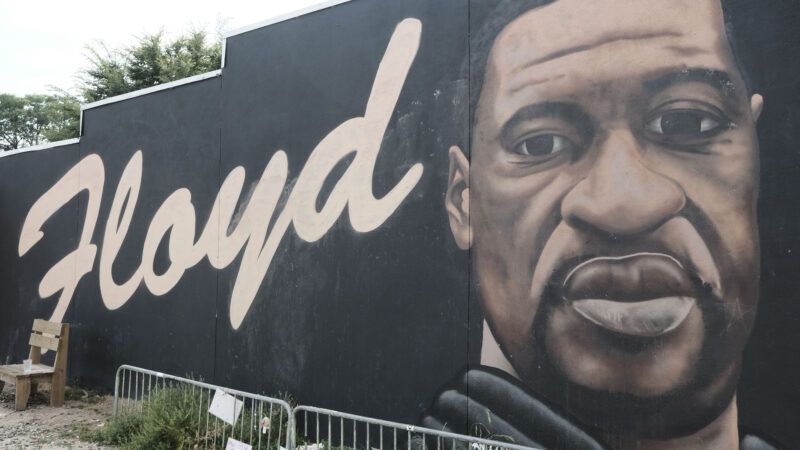Justice Department Finds 'Deeply Disturbing' and Illegal Policing in Minneapolis
Minneapolis police used gratuitous force, discriminated against black and Native American residents, and retaliated against people exercising their First Amendment rights.

Attorney General Merrick Garland announced today that a Justice Department investigation found that the Minneapolis Police Department (MPD) engaged in "deeply disturbing" and illegal policing that violated the constitutional rights of residents.
A report by the Justice Department's Civil Rights Division concluded that the Minneapolis Police Department (MPD) used unreasonable and excessive force, discriminated against black and Native American residents, and retaliated against reporters and citizens who recorded the police, violating their First Amendment rights.
The investigation was launched in the wake of the police killing of George Floyd in Minneapolis in 2020, and Garland said it uncovered the systemic problems that led to Floyd's murder.
"George Floyd's death had an irrevocable impact on his family, on the Minneapolis community, on our country, and on the world," Garland said in a press conference. "The patterns and practices of conduct the Justice Department observed during our investigation are deeply disturbing. They erode the community's trust in law enforcement. And they made what happened to George Floyd possible."
The City of Minneapolis cooperated with the Justice Department, and the report notes that it has already taken several steps to reform its practices. City officials and the Justice Department have reached a tentative agreement to enter into a court-enforced settlement, known as a "consent decree," to fix remaining issues.
Still, the report offers withering criticism of MPD's use-of-force practices, finding that officers unreasonably and gratuitously used bodily force, Tasers, pepper spray, and firearms, including on minors and suspects who were compliant or handcuffed.
In one instance, an MPD officer tased a man who was filming him while a DOJ investigator was riding along in the squad car. The report also notes a 2017 incident where an officer fatally shot a woman who approached his squad car and "spooked" him. The woman had called 911 to report a possible sexual assault in a nearby alley.
The report found MPD also routinely violated the First Amendment rights of people who criticized, protested, or recorded them, including credentialed media.
For example, an MPD officer put a teenager in a neck restraint for yelling "fuck the police" and insisted, incorrectly, that the teen did not have a First Amendment right to say it. In another instance, during the unrest following Floyd's murder, a group of MPD officers encountered several reporters sheltering in a gas station. The officer pushed one journalist to the ground, and when he held up his press credentials, an MPD sergeant pepper sprayed him in the face and walked away.
"For years, MPD used dangerous techniques and weapons against people who committed at most a petty offense and sometimes no offense at all," the report says. "MPD used force to punish people who made officers angry or criticized the police. MPD patrolled neighborhoods differently based on their racial composition and discriminated based on race when searching, handcuffing, or using force against people during stops. The City sent MPD officers to behavioral health-related 911 calls, even when a law enforcement response was not appropriate or necessary, sometimes with tragic results. These actions put MPD officers and the Minneapolis community at risk."
These sorts of reports and consent decrees are one of the most powerful tools the federal government has to push cities to reform rotten police departments, but they also depend on favorable political winds. The Obama administration launched a record number of such "pattern or practice" investigations, which found widespread police misconduct in Chicago, Baltimore, and Ferguson, Missouri. However, the Trump administration, which painted itself as a staunch ally of police, opposed such investigations and dramatically pared them back.
Under the Biden administration, the Justice Department's Civil Rights Division has once again ramped up its investigations into systemic police misconduct. In March, another Justice Department probe identified severe and pervasive constitutional violations by the Louisville Metro Police Department (LMPD). The report documented stunningly unprofessional behavior by LMPD officers: "Some officers have videotaped themselves throwing drinks at pedestrians from their cars; insulted people with disabilities; and called Black people 'monkeys,' 'animal,' and 'boy.'"
The two-year investigation also found that LMPD officers unreasonably deployed Tasers and police dogs on compliant and nonthreatening suspects and used unjustified neck restraints.
Presidential candidate and Republican Florida Gov. Ron DeSantis recently said in an interview with RealClearPolitics that one of his priorities if elected would be to reorganize the Justice Department's Civil Rights Division.

Show Comments (79)